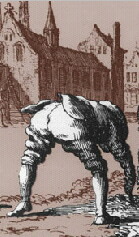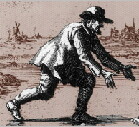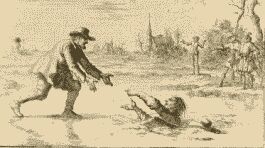Brother Dirk and Other Stories
Chapter Ten: The Inquisitor
 Before sunset on their first day in prison, all six believers had been sent to
their own cells. Now it was Dirk Willems' turn to be separated from the
others. Elisabeth cried when he left. Guards pushed him into an upstairs
room, empty except for a tattered sheet, and locked the door behind him.
Before sunset on their first day in prison, all six believers had been sent to
their own cells. Now it was Dirk Willems' turn to be separated from the
others. Elisabeth cried when he left. Guards pushed him into an upstairs
room, empty except for a tattered sheet, and locked the door behind him.
Dirk shivered, looked through the window at the half moon over the large
pond outside and prayed. Death might not be far away, and he was deeply
aware of the spots and wrinkles still in his life. "Not my will, Lord, but your
will be done," he repeated.
Weeks went by. Winter was coming. Dirk was faced with judges and priests
who offered him freedom if he would deny his faith. He said little to them,
and avoided their arguments. He had little to eat. He still pleaded with God to
help him face the future, yet he felt he still lacked the grace he needed to lay
down his life.
Days dragged on. When Dirk had been in prison eleven weeks, he was called to appear before the
inquisitor, the Dean of Ronse, whom he had not seen since his arrest. When he entered the room
where the inquisitor sat, Dirk humbly greeted him. The Dean of Ronse returned Dirk's greeting and
looked at him for a long moment before speaking further.
"Do you pray for me?" the inquisitor asked. Dirk assured him that they did.
"What do you people call me? Do you call me Saul?"
"I have sometimes heard you called the Inquisitor," Dirk answered. Everyone in the room laughed.
"And sometimes the Dean of Ronse."
"Yes, that is my name," the inquisitor said. "Dirk, I am very glad of one thing, namely, what the
prosecutor told me, that you are ready to confess your guilt if it can be proved to you by the
Scriptures that you have disobeyed the Word of God."
"Yes, my lord," he answered.
"My son, you must allow us to teach you the true faith, for we want to save your soul."
"Is saving souls so important to you?" Dirk asked.
"Yes," the inquisitor said, sounding as earnest as he could.
"Well then," Dirk said, "go into the city, to every place, to the drunkards, swearers, cursers, covetous,
prideful, idolaters, gluttons and murderers. All these are still your brethren. Go seek their souls.
Christ has found mine. Speak also to your judges, who are violent and unjust, yes, who shed
innocent blood."
"Should we go and rebuke the judges?" the inquisitor scoffed.
"Is God a respecter of persons?" Dirk asked. "Would you call yourself a minister of God and be a
respecter of persons?"
"This would cause an uproar in the city, and they would kill us," answered the inquisitor cleverly.
"Then suffer for righteousness sake." Dirk challenged. "But it seems to me you have no great desire
for that. As it is, if you truly wanted to deal with sin in your church as Christ commanded, you
would need to cast out, not only the magistrates, but the leaders of your church, the emperor, the
king, and you yourselves, with your entire multitude who are still your brethren. Yes, not many
would be left, for your house is on fire with the flames of hell. You should first put it out before
coming to see whether our house is on fire."
"You people certainly know how to preach, don't you? Is it not a pity that we allow ourselves to be
so deceived?" the inquisitor complained.
"Yes, my lord," Dirk replied.
The inquisitor frowned blankly for a moment before he realized what Dirk meant, then gritted his
teeth and glared at him over the top of his desk. "I speak of you and others, who have left our holy
mother church and forsaken the Word of God, and allow yourselves to be fooled by a set of common
tradesmen such as Menno, Lennart and other such rascals," he declared impatiently.
"I have not forsaken the Word of God, for that is what my faith is founded upon, and not on the
doctrines of men such as Menno and Lennart," Dirk replied quietly.
"What? How can you be founded on the Word of God, since you contradict the Christian faith?" the
inquisitor retorted.
"I do not contradict the Christian faith, for everything I do is focused toward it," Dirk said. "But you
take one view of the Scriptures and I another, and no one can judge which is right and which is
wrong, except spiritual men through the Spirit of God."
The inquisitor laughingly asked him, "Have you the Spirit of God?"
"My lord, you must not ask me this in jest, for I do not boast of it," Dirk responded quickly.
"Why will you not allow yourself to be taught by those wiser than yourself?" the inquisitor repeated.
"I seek always to follow the best and the most righteous, and I am not so stubborn in my faith. If I
knew a better way to eternal life than the one which I now have, I would eagerly accept it," he
answered.
"Others have preached the Word of God to you, but you believe nothing but your fanatic opinion,"
the inquisitor said as he leaned back in his chair.
"Do you think we run on uncertainties, my lord?" Dirk replied. "I assure you, if I knew better, I
would not want to resist the Word of God against my conscience. Do you think, if I understood it
differently, I should want to find my pleasure and amusement here in being imprisoned and chained
day after day, never seeing my wife and family again? Do you think I would willingly and
purposely seek out pain and suffering for the rest of my life, expecting death every day, only to gain
eternal damnation after I died?"
"Yes my child, take care what you decide," said the inquisitor as he raised his inkstand from the
table, "for as sure as I know that I hold this inkstand, so sure am I that you will never see the face of
God, if you die in this evil faith you have."
"If that is true," Dirk answered, "then we are the most miserable men under heaven, for we are cast
out, despised, rejected and hated before the whole world, and flee from place to place, so that we
suffer continually in our bodies and have no rest, and according to what you say, we are also to
suffer after this life... No, no, my lord, we feel quite a different witness and promise through the
Word of God," Dirk concluded cheerfully.
"You say that only because you are deceived," the inquisitor responded gloomily, "but it will do you
no good. It is because of the devil that you people are so bold and cheerful even unto death."
"Where then is the people who must follow their Master through suffering and affliction to eternal
life, as Christ has said, to be hated for His name's sake?" Dirk challenged.
"That was spoken to the apostles only," answered the inquisitor with a thin smile, "and your sect has
existed for only twenty or thirty years."
"So you say, but it has always been the case that those who would live godly in Christ Jesus have
had to suffer persecution, according to the words of Paul. The followers of Christ were called to be a
flock of sheep and lambs, as harmless as doves, and so changed as to be like little children," Dirk
added.
"It is true, it was so at the time," muttered the inquisitor as he fingered his inkstand.
"And shall the children of God have a different nature now from what they had then? Should they
have the nature of wolves?" Dirk inquired.
"Certainly not. I do not say that," he answered, eyes widened.
"Yet it appears to me, my lord, that those who now boast of being children of God have the true
nature of ravening wolves. For when sheep see a wolf, they flee, they do not try to kill the wolf, as
you seek to kill us. Did the apostles persecute and maintain their church with the sword, as you do?"
"Yes they did, indeed they did, but you won't believe what is told you."
"Jesus commanded that the blades of wheat and tares be allowed to grow up together. Which of the
two am I?"
"You are the tares," answered the inquisitor.
"Then why don't you let me grow up until the harvest?"
The inquisitor smiled at Dirk as a cat might look at a mouse. "The lord of the field commanded his
servants not to spoil the blades of wheat by pulling up the tares. But I can go along the edges, and
here and there pluck out a handful or two, yes, sometimes six, eight, ten, twelve, yes, now and then a
hundred or two, without spoiling the wheat."
Dirk shivered, for he was speaking of the lives and deaths of his brothers and sisters. Nevertheless,
he continued, "Then you are wiser than the servants of the Lord."
"I can certainly well do this," insisted the inquisitor.
"When I listened to the priests and followed your teachings, was I a good blade?" Dirk asked. "And
am I now a bad blade?"
"Yes to both," the inquisitor replied smugly.
"Well then, if I am a bad blade, according to your own words, you yourself have spoiled me by your
plucking," Dirk said, "and yet you say you can do it so well."
The inquisitor stared at him in shock.
"Remember when you plucked the four blades of Ghent five years ago, when you stood on the
scaffold before their execution and preached, and the people said 'Antichrist speaks'?" Dirk
continued. "It was then that I began to investigate the faith for which men could die so boldly, and I
examined the very scripture which you quoted, from II Timothy 2 and 3. And I found that I must
separate myself from such an evil people as is described in those verses. When I saw that you are
such a people, I separated myself from the multitude of your church, and do so still. So what
becomes of you now, you and your plucking? The more blades you pluck the more you spoil.
According to your own words, it would be better if you would stop, and let God judge."
The inquisitor took a long time trying to think of something to say. Finally he left without saying
anything, and Dirk went back to his cell.
Previous Chapter
 Next Chapter
Next Chapter



 Before sunset on their first day in prison, all six believers had been sent to
their own cells. Now it was Dirk Willems' turn to be separated from the
others. Elisabeth cried when he left. Guards pushed him into an upstairs
room, empty except for a tattered sheet, and locked the door behind him.
Before sunset on their first day in prison, all six believers had been sent to
their own cells. Now it was Dirk Willems' turn to be separated from the
others. Elisabeth cried when he left. Guards pushed him into an upstairs
room, empty except for a tattered sheet, and locked the door behind him.